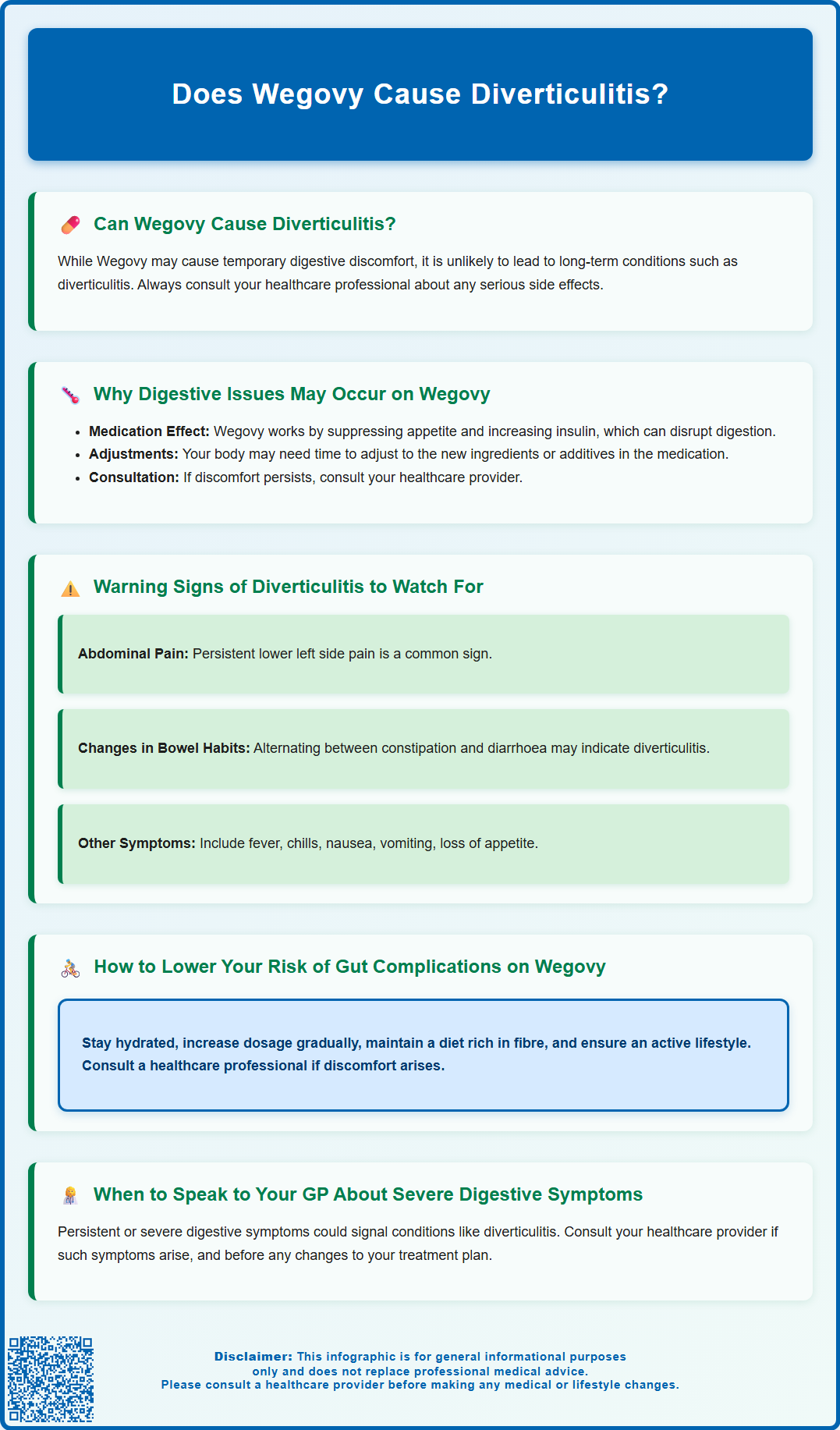Are you exploring GLP-1 treatments like Wegovy for weight management and metabolic health, but have concerns about potential side effects? Delve deep with Bolt Pharmacy as we challenge the question "Does Wegovy Cause Diverticulitis?" Join us as we unravel the correlations, causes, and precautions associated with this GLP-1 medication, providing you with trustworthy insights to support your health journey.
Summary: Wegovy, a GLP-1 weight loss medication, is not typically associated with causing diverticulitis.
- Wegovy is designed to stimulate insulin production and suppress appetite to support weight loss.
- Diverticulitis is a digestive system condition where small pouches in the intestines become inflamed or infected, often related to factors like age, diet, and genetics.
- Wegovy works within the GLP-1 pathway focusing on blood glucose control and appetite management, not typically associated with causing diverticulitis.
- Wegovy may cause temporary digestive discomfort in some users but should not give rise to long-term issues like diverticulitis.
- There's no reported connection between GLP-1 medications like Wegovy and diverticulitis.
- Digestive discomfort should always be reported to a healthcare professional, and all changes in medication should be made under their advice.
Table of Contents
Understanding Wegovy and How It Works
Wegovy (semaglutide 2.4 mg) is a prescription medicine licensed in the UK for weight management in adults with obesity or those who are overweight with weight-related health conditions. It belongs to a class of medications called glucagon-like peptide-1 (GLP-1) receptor agonists, which were originally developed for type 2 diabetes management but have proven highly effective for weight loss.
The mechanism of action centres on mimicking a naturally occurring hormone called GLP-1, which is released from the intestine after eating. Semaglutide works by:
-
Reducing appetite by acting on receptors in the brain that control hunger and satiety
-
Slowing gastric emptying, which helps you feel fuller for longer after meals
-
Improving blood sugar regulation by enhancing insulin secretion when glucose levels are elevated
Wegovy is administered as a once-weekly subcutaneous injection, typically starting at a low dose (0.25 mg) and gradually increasing over 16-20 weeks to the maintenance dose of 2.4 mg, as outlined in the Summary of Product Characteristics (SmPC). This gradual titration helps minimise gastrointestinal side effects, which are common with GLP-1 receptor agonists.
According to NICE Technology Appraisal (TA875), Wegovy is recommended for adults with a BMI of at least 35 kg/m² (or lower thresholds for certain ethnic groups) who have at least one weight-related comorbidity. It should be used alongside a reduced-calorie diet and increased physical activity, and is available through NHS specialist weight management services for eligible patients. Treatment is recommended for a maximum of 2 years.
The medication has demonstrated significant weight loss in clinical trials, with participants losing an average of 12-15% of their body weight over 68 weeks in the STEP clinical trial programme. However, like all medications, Wegovy carries potential side effects that patients and healthcare professionals should understand thoroughly before commencing treatment.
Importantly, Wegovy must be avoided during pregnancy and should be discontinued at least 2 months before a planned pregnancy. It is also not recommended during breastfeeding. Effective contraception is advised for women of childbearing potential while using this medication.
Suspected adverse reactions should be reported to the MHRA Yellow Card Scheme (yellowcard.mhra.gov.uk).
What Is Diverticulitis and Its Common Causes
Diverticulitis is an inflammatory condition affecting the digestive system, specifically involving small pouches called diverticula that can form in the lining of the intestine, most commonly in the colon (large bowel). When these pouches become inflamed or infected, the condition progresses from asymptomatic diverticulosis to symptomatic diverticulitis.
The condition typically presents with:
-
Persistent abdominal pain, usually in the lower left side (though right-sided pain can also occur, particularly in Asian populations)
-
Fever and elevated inflammatory markers
-
Changes in bowel habits, including diarrhoea or constipation
-
Nausea and vomiting
-
Tenderness on abdominal examination
Common risk factors and causes include:
Age: Diverticulitis predominantly affects people over 40, with incidence increasing significantly after age 60. The prevalence of diverticular disease in the UK is estimated at 5% in those under 40, rising to over 50% in those over 70, according to NICE Clinical Knowledge Summary (CKS).
Dietary factors: Low-fibre diets are associated with increased risk, though recent research suggests the relationship is more complex than previously thought. A diet lacking in fruits, vegetables, and whole grains may contribute to increased colonic pressure during bowel movements.
Obesity: Excess body weight, particularly visceral adiposity, is associated with increased risk of diverticulitis and its complications.
Lifestyle factors: Smoking, excessive alcohol consumption, lack of physical activity, and certain medications (particularly NSAIDs and opioids) have been linked to higher diverticulitis risk.
Genetic predisposition: Family history plays a role, with some individuals having inherited susceptibility to developing diverticula. The exact pathophysiology involves increased intraluminal pressure, weakening of the colonic wall, and alterations in gut microbiota, though the precise mechanisms remain under investigation.
According to NICE Guideline NG147 on diverticular disease, management approaches vary depending on severity, with uncomplicated cases often managed conservatively while complicated cases may require antibiotics or surgical intervention.

Does Wegovy Cause Diverticulitis?
There is currently no established causal link between Wegovy (semaglutide) and diverticulitis based on available clinical evidence and regulatory data. Diverticulitis is not listed as a known adverse effect in the Summary of Product Characteristics (SmPC) for Wegovy, nor has it been identified as a safety signal in post-marketing surveillance by the MHRA or EMA.
The clinical trial programme for semaglutide 2.4 mg (STEP trials), which included over 4,500 participants followed for up to 68 weeks as documented in the European Public Assessment Report (EPAR), did not identify diverticulitis as a treatment-emergent adverse event occurring at rates higher than placebo. However, it is important to note that:
-
Clinical trials have limitations in detecting rare adverse events, particularly those that may take extended periods to develop
-
Post-marketing surveillance continues to monitor for previously unidentified safety concerns
-
Individual case reports may emerge, but these do not establish causation without rigorous epidemiological analysis
Why the question arises: The association between Wegovy and diverticulitis may be questioned because:
Gastrointestinal effects: Wegovy commonly causes GI side effects including nausea, constipation, and changes in bowel habits, which might theoretically affect colonic function. However, these effects relate to the medication's mechanism of slowing gastric emptying rather than causing structural changes to the bowel wall.
Overlapping risk factors: Patients prescribed Wegovy for obesity management may already have elevated baseline risk for diverticulitis due to their weight, age, and dietary patterns—factors that exist independently of medication use.
Constipation concerns: Whilst constipation is a recognised side effect of Wegovy (reported in approximately 24% of users according to the SmPC), and chronic constipation has been theoretically linked to increased colonic pressure, there is no evidence that medication-induced constipation specifically triggers diverticulitis in those without pre-existing diverticula.
If you develop symptoms suggestive of diverticulitis whilst taking Wegovy, this should be evaluated on its own merits rather than automatically attributed to the medication. Any suspected adverse reactions should be reported through the MHRA Yellow Card scheme (yellowcard.mhra.gov.uk).
Gastrointestinal Side Effects of Wegovy
Gastrointestinal adverse effects are the most commonly reported side effects with Wegovy, occurring in the majority of patients, particularly during dose escalation. Understanding these effects helps distinguish between expected medication responses and symptoms requiring medical evaluation.
Common GI side effects (affecting more than 1 in 10 people) according to the SmPC:
-
Nausea: The most frequent side effect, reported in approximately 44% of patients in clinical trials, usually most pronounced during the first few weeks and with dose increases
-
Diarrhoea: Affects roughly 30% of users, typically mild to moderate and transient
-
Vomiting: Occurs in about 24% of patients, often associated with eating too quickly or consuming large portions
-
Constipation: Reported in approximately 24% of users, which may require dietary modification or occasional laxative use
-
Abdominal pain or discomfort: Affects around 20% of patients, usually described as cramping or bloating
-
Dyspepsia and reflux: Indigestion and heartburn occur in approximately 9% of users
Less common but significant GI effects:
-
Delayed gastric emptying: Whilst this is the intended pharmacological effect, in some cases it can cause persistent nausea, vomiting, and inability to tolerate food
-
Pancreatitis: Has been reported in clinical trials and post-marketing; presents with severe, persistent abdominal pain radiating to the back. If pancreatitis is suspected, Wegovy should be discontinued and appropriate diagnostic tests performed urgently
-
Gallbladder problems: Rapid weight loss increases risk of gallstone formation, with cholelithiasis reported in approximately 1.6% of Wegovy users
-
Intestinal obstruction/ileus: Cases have been reported in post-marketing surveillance, particularly in patients with pre-existing GI conditions
Management strategies recommended by healthcare professionals include:
-
Eating smaller, more frequent meals rather than large portions
-
Avoiding high-fat, spicy, or heavily processed foods
-
Staying well-hydrated, particularly if experiencing diarrhoea or vomiting, to prevent dehydration and potential acute kidney injury
-
Not lying down immediately after eating to minimise reflux
-
Ensuring adequate fibre intake to prevent constipation
-
Taking the medication on the same day each week to maintain steady levels
Most GI side effects improve over time as the body adjusts to the medication, typically becoming less troublesome after 4-8 weeks at each dose level. If GI side effects are severe or persistent, your healthcare provider may recommend slowing or pausing dose escalation, or in some cases, reducing the dose temporarily.
When to Seek Medical Advice While Taking Wegovy
Knowing when to contact your GP or seek urgent medical attention whilst taking Wegovy is essential for safe medication use. Whilst many side effects are manageable, certain symptoms require prompt medical evaluation.
Contact your GP or prescribing clinician if you experience:
-
Persistent nausea or vomiting lasting more than a few days or preventing adequate fluid intake, as this may lead to dehydration
-
Severe or worsening constipation not responding to dietary changes or over-the-counter remedies
-
Unexplained abdominal pain that is persistent or progressively worsening
-
Signs of dehydration: dark urine, dizziness, reduced urination, dry mouth, or feeling faint
-
Unintentional weight loss exceeding recommended rates (more than 1-2 kg per week)
-
Changes in vision or unusual fatigue if you have diabetes and are taking other glucose-lowering medications, as these might indicate hypoglycaemia
-
Changes in mood including depression (monitor your mental wellbeing while taking any medication)
Seek immediate medical attention (call 999 or attend A&E) if you develop:
-
Severe abdominal pain, particularly if accompanied by fever, which could indicate pancreatitis, diverticulitis, or other serious conditions
-
Persistent vomiting with inability to keep down fluids for more than 24 hours
-
Signs of allergic reaction: difficulty breathing, swelling of face or throat, severe rash
-
Symptoms of gallbladder problems: sudden severe pain in the upper right abdomen, particularly after eating, with or without jaundice (yellowing of skin or eyes)
-
Blood in vomit or stools, or black, tarry stools
-
Severe, persistent back pain radiating from the abdomen, which may indicate pancreatitis
For urgent health concerns that aren't emergencies, you can also contact NHS 111 (call 111 or visit 111.nhs.uk).
Specific considerations for diverticulitis symptoms:
If you develop persistent lower abdominal pain (particularly left-sided), fever, altered bowel habits with pain, or tenderness when pressing on your abdomen, contact your GP promptly. These symptoms warrant investigation regardless of whether you are taking Wegovy. According to NICE Guideline NG147, management of diverticulitis depends on severity—uncomplicated cases may be managed with pain relief and monitoring, while complicated cases may require antibiotics or hospital admission.
Before starting Wegovy, inform your healthcare provider if you have:
-
History of pancreatitis or gallbladder disease
-
Pre-existing gastrointestinal conditions including inflammatory bowel disease or diverticular disease
-
Severe gastrointestinal disease
-
If you are pregnant, breastfeeding, or planning pregnancy (Wegovy must be stopped at least 2 months before planned conception)
Regular follow-up with your prescribing clinician is essential to monitor treatment response, manage side effects, and ensure the medication remains appropriate for your individual circumstances.
Frequently Asked Questions
Can Wegovy cause diverticulitis?
Wegovy is a GLP-1 weight loss medication and it is unlikely to cause diverticulitis. This is a condition related to the digestive system and there has been no reported connection between such medicines and diverticulitis. Wegovy primarily focuses on blood glucose control and appetite suppression. However, everyone's body reacts differently to medication, so it's important to consult a healthcare professional if you experience any severe side effects.
What side effects of Wegovy could be confused with diverticulitis?
Wegovy could cause some digestive discomfort like many medications, but these are typically mild and temporary. Symptoms could include slight nausea, diarrhoea, or constipation. However, these symptoms are also common indicators of many other digestive issues and differ from severe conditions such as diverticulitis. Always consult a healthcare professional if you experience any severe or persistent symptoms.
Are there any known cases of diverticulitis caused by Wegovy?
To date, there has been no reported connection between GLP-1 medications like Wegovy and diverticulitis. As Wegovy works by managing blood glucose levels and appetite, it is not generally implicated in digestive system conditions like diverticulitis. As always, it's important to discuss any concerns or side effects with a healthcare professional.
The health-related content published on this site is based on credible scientific sources and is periodically reviewed to ensure accuracy and relevance. Although we aim to reflect the most current medical knowledge, the material is meant for general education and awareness only.
The information on this site is not a substitute for professional medical advice. For any health concerns, please speak with a qualified medical professional. By using this information, you acknowledge responsibility for any decisions made and understand we are not liable for any consequences that may result.
Heading 1
Heading 2
Heading 3
Heading 4
Heading 5
Heading 6
Lorem ipsum dolor sit amet, consectetur adipiscing elit, sed do eiusmod tempor incididunt ut labore et dolore magna aliqua. Ut enim ad minim veniam, quis nostrud exercitation ullamco laboris nisi ut aliquip ex ea commodo consequat. Duis aute irure dolor in reprehenderit in voluptate velit esse cillum dolore eu fugiat nulla pariatur.
Block quote
Ordered list
- Item 1
- Item 2
- Item 3
Unordered list
- Item A
- Item B
- Item C
Bold text
Emphasis
Superscript
Subscript












